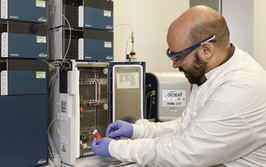A Sticky Situation
The Medicine Maker catches up with Warwick Bowen, professor at The University of Queensland, who outlines the importance of viscosity for pharmaceutical product development and the new technique his team have developed to accurately measure it.

Credit: University of Queensland
Why is viscosity such an important factor for drug developers to consider?
Viscosity is broadly important to biology. For instance, it is thought to govern chemical reactions in cells, indicates their health, and is necessary for the structural properties of tissues. There are many reasons why you would want better viscosity measurements.
In pharmaceutical development, it offers a range of important information. Viscosity often changes during chemical reactions and therefore can be a marker of the stage of the reaction, its yield, and the quantity of reactants remaining. Faster, more accurate viscosity measurements can save time and provide important quality control. Many pharmaceuticals are provided in the form of lotions, ointments, or creams. Here, viscosity is important to ensure the correct texture and that the pharmaceutical can be appropriately applied.
What are the current challenges in measuring viscosity?
Generally, bulky machines termed “rheometers” are used to determine the viscosity of a large sample of material, essentially stretching it and measuring its resistance. However, this is slow and only works for relatively large samples. An alternative is to use optical tweezers.
Optical tweezers are basically a tightly focused laser beam. Particles within the beam feel forces from the laser and are trapped in its focus. Measuring their motion within a solution allows the viscosity of that solution to be determined at very small scales – down to tens of nanometers. However, like rheometers, these measurements are slow, generally taking around a second for one measurement. Therefore, they are unable to monitor fast changes in viscosity such as those that can occur during chemical reactions. They are also relatively imprecise, typically only providing viscosity measurements with about 10 percent accuracy.
What did your research show?
Optical tweezers work by tracking the Brownian motion of microparticles. The theory of Brownian motion was first explained by Einstein, who showed that the position of microparticles randomly fluctuates due to thermodynamics. However, Einstein also realized that, with fast enough measurements, a different sort of behavior should emerge in which particles move in smooth trajectories like that of a ball when thrown. He concluded that it would be impossible to achieve measurements fast enough for this – but recent research has proved him wrong.
The key idea of our work is that, if you can reach the “ballistic regime,” you can make extremely fast measurements of viscosity. If you can measure the velocity, you can determine the kinetic energy. This is directly connected to viscosity, because viscosity tells you how fast the kinetic energy dissipates.
To implement this idea, we developed optical tweezers that can track microparticles down to one femtometer (a millionth of a billionth of a meter) during a one-second measurement. This allowed us to measure viscosity in times as short as twenty microseconds, four orders of magnitude faster than ever before. It also allowed us to improve the precision of the measurement.
What’s next?
Our technique can be introduced to monitor chemical reactions with a high level of precision. This could open the door to improved yield and quality control in pharmaceutical production. It could also allow measurements of the active dynamics of living cells after a pharmaceutical is administered. This could allow for a new level of detail on the effects of pharmaceuticals on the human body at the single-cell level. We are very excited to see where our technology goes and what we discover by using it!
After finishing my degree, I envisioned a career in science communications. However, life took an unexpected turn and I ended up teaching abroad. Though the experience was amazing and I learned a great deal from it, I jumped at the opportunity to work for Texere. I'm excited to see where this new journey takes me!



















